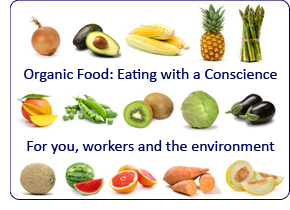24
Jun
Food Guide Urges Organic Choices to Protect Environment and Workers
 (Beyond Pesticides, June 24, 2010) Our food purchases have a direct effect on the health of our environment and those who grow and harvest what we eat. Beyond Pesticides launched its Organic Food: Eating with a Conscience guide, which shows consumers why, according to the group, “food labeled organic is the right choice.” Jay Feldman, executive director of Beyond Pesticides, said, “In addition to serious health questions linked to actual residues of toxic pesticides on the food we eat, our food buying decisions support or reject hazardous agricultural practices, protection of farmworkers, and stewardship of the earth.”
(Beyond Pesticides, June 24, 2010) Our food purchases have a direct effect on the health of our environment and those who grow and harvest what we eat. Beyond Pesticides launched its Organic Food: Eating with a Conscience guide, which shows consumers why, according to the group, “food labeled organic is the right choice.” Jay Feldman, executive director of Beyond Pesticides, said, “In addition to serious health questions linked to actual residues of toxic pesticides on the food we eat, our food buying decisions support or reject hazardous agricultural practices, protection of farmworkers, and stewardship of the earth.”
The Eating with a Conscience guide explains to consumers the effect they are having on health and the environment when they purchase food grown with chemical-intensive methods, even if a large number of residues do not remain on the finished food product. The group points to USDA organic certification as “the only system of food labeling that is subject to independent public review and oversight, assuring consumers that toxic, synthetic pesticides used in conventional agriculture are replaced by management practices focused on soil biology, biodiversity, and plant health.”
“Organic practices under the Organic Foods Production Act eliminate commonly used toxic chemicals in the production and processing of food that is not labeled organic, pesticides that contaminate our water and air, hurt biodiversity, harm farmworkers, and kill bees, birds, fish and other wildlife,” said Mr. Feldman.
Recent media attention has focused consumers on purchasing foods that are often referred to as “clean,” but grown with toxic chemicals that show up as residues on their food in small amounts or are not detectable. While this approach is helpful to consumers in alerting them to hazardous residues on food, those very same “clean” food commodities can be grown with hazardous pesticides that get into waterways and groundwater, contaminate nearby communities, poison farmworkers, and kill wildlife.
For example, while conventional onions grown with toxic chemicals show low pesticide residues on the finished commodity, Eating with a Conscience explains that there are 63 pesticides with established tolerances for onions: 26 are acutely toxic creating a hazardous environment for farmworkers, 60 are linked to chronic health problems (such as cancer), 8 contaminate streams or groundwater, and 54 are poisonous to wildlife. While not all listed pesticides are applied to every onion, they may be used in the production of all onions, making it impossible at the point of sale to identify which specific chemicals are used.
With its Eating with a Conscience guide, Beyond Pesticides is asking consumers to, when possible, buy organic food and make the “right food choice —good for you, the environment and workers.” View the database here.










